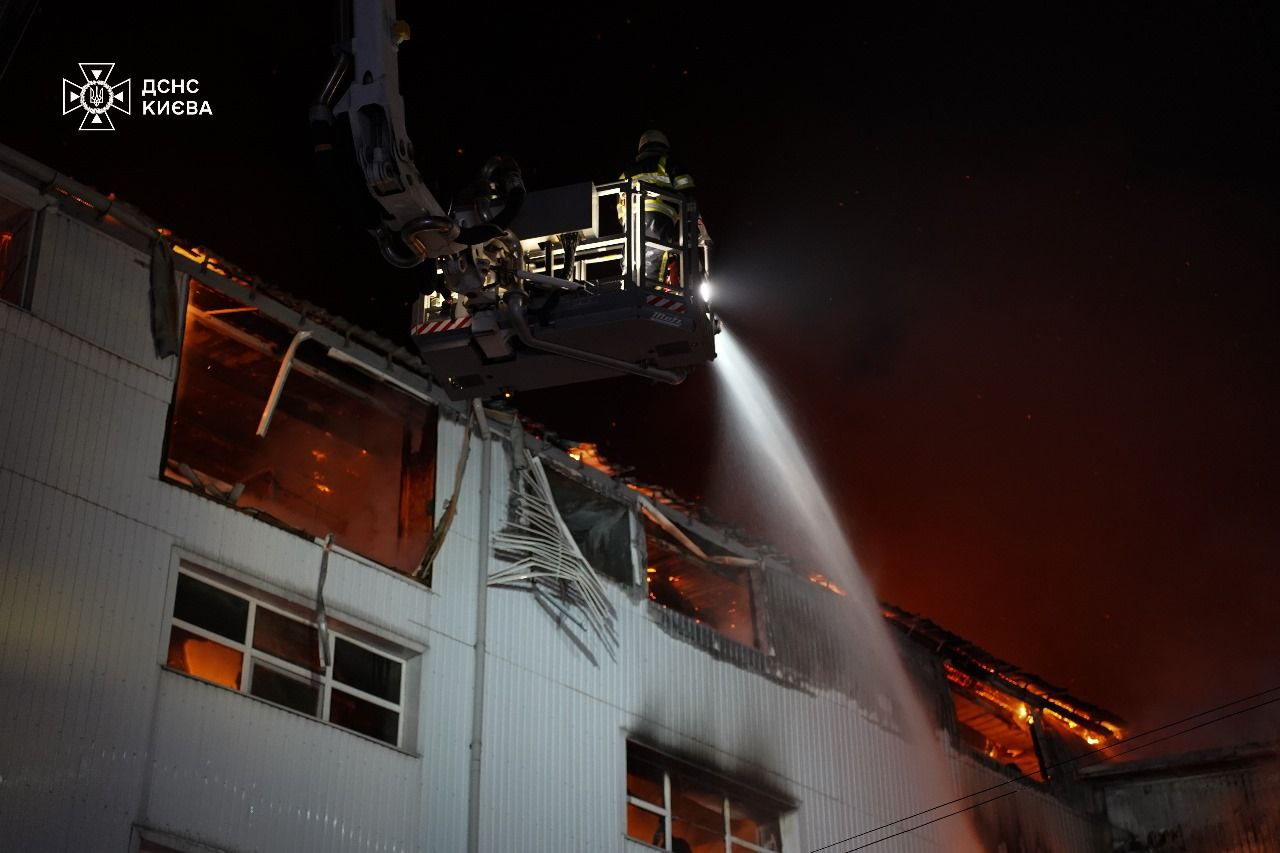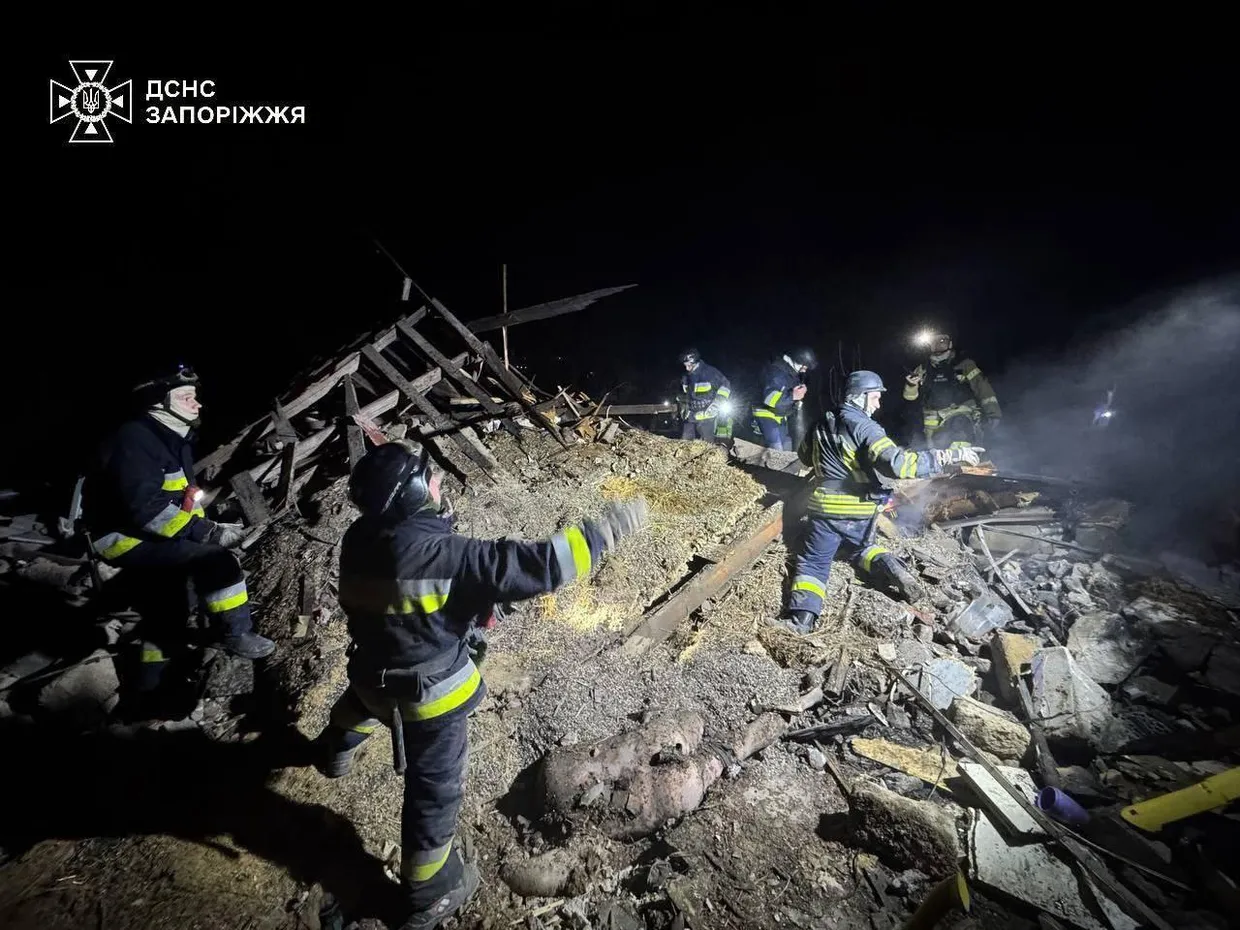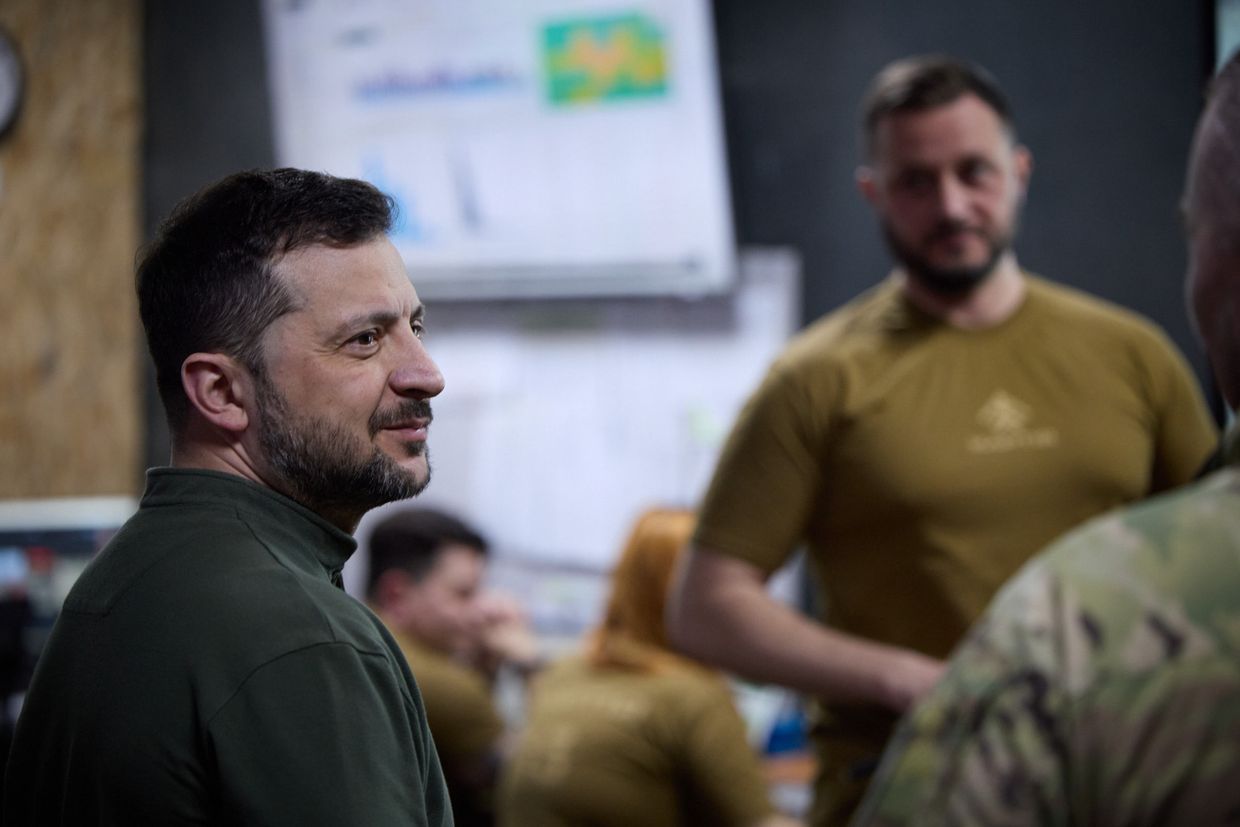As Riyadh Talks Approach, Russian Drones Kill Families in Ukrainian Cities While Trump Envoy Echoes Moscow’s Territorial Demands
Summary of the Day – March 22, 2025
Just days before crucial negotiations in Saudi Arabia, Russia’s actions on the ground betray any notion of a genuine ceasefire. Despite Putin’s claimed order to halt strikes on energy infrastructure, Russian forces have launched over 179 drones at Ukrainian cities, killing a family of three in Zaporizhzhia and destroying residential buildings in Kyiv. Meanwhile, U.S. Special Envoy to the Middle East Steve Witkoff sparked controversy by openly echoing Kremlin propaganda regarding occupied Ukrainian territories. Europe continues to step up military preparations, with the Czech President announcing readiness to deploy troops as part of a peacekeeping mission. As Ukrainian and U.S. delegations meet in Riyadh on March 23 ahead of broader talks the following day, the divergence between diplomatic rhetoric and battlefield reality grows ever wider.
 Firefighters extinguish a blaze in a residential building in Kyiv after Russian drones targeted the city in a mass overnight attack. (State Emergency Service / Telegram)
Firefighters extinguish a blaze in a residential building in Kyiv after Russian drones targeted the city in a mass overnight attack. (State Emergency Service / Telegram)
Zaporizhzhia Family Slaughtered: Russia’s “Ceasefire” Claims Ring Hollow
Russian forces attacked the city of Zaporizhzhia on the evening of March 21, killing three people, including a teenage girl and her parents. At least 16 others were wounded as multiple high-rises and homes caught fire in the strike. Rescue workers struggled for over ten hours to save the mother’s life but ultimately failed.
 First responders work at the site of Russian strike on the city of Zaporizhzhia. (State Emergency Service)
First responders work at the site of Russian strike on the city of Zaporizhzhia. (State Emergency Service)
“Russia has once again violated the ceasefire and killed a child in Zaporizhzhia with a Shahed,” said President Volodymyr Zelensky’s chief of staff, Andriy Yermak, referring to the Iranian-style exploding drones that Moscow has deployed throughout the conflict.
This marked the second attack on Zaporizhzhia in just 24 hours, following a strike on March 20 that injured six people, including a four-year-old boy. The brutal attack directly contradicts Putin’s claimed order to halt attacks on civilian infrastructure during his call with Donald Trump.
Drone Barrage Across Ukraine: Nearly 200 Aircraft Target Cities
Russia launched a massive overnight drone attack against Ukraine, deploying 179 Shahed and decoy drones from staging areas in Russia and occupied Crimea. Ukrainian forces shot down 100 drones over southern, northern, and central Ukraine, while another 63 were reportedly “lost” due to electronic warfare countermeasures.
The overnight assault damaged residential buildings across multiple cities, including Kyiv, where two people were killed when drones struck apartment complexes in the capital’s Dniprovskyi and Holosiivskyi districts. Fires broke out in several buildings, forcing the evacuation of dozens of residents and causing significant property damage.
“Today, the Russians are once again demonstrating their ‘desire for peace,'” said Tymur Tkachenko, head of the Kyiv City Military Administration. “In reality, terrorists are simply launching deadly weapons at residential buildings.”
Emergency responders reported intensifying attacks over the past two months, with drone strikes frequently targeting both energy infrastructure and residential areas. Despite the purported ceasefire on energy targets, the pattern of Russian aerial bombardment has continued unabated.
The Trumpet of Moscow: Trump Envoy Echoes Kremlin Talking Points
In a stunning departure from traditional U.S. diplomacy, Special Envoy to the Middle East Steve Witkoff openly repeated Russian propaganda about occupied Ukrainian territories during an interview with American far-right commentator Tucker Carlson.
“They are Russian-speaking, and there have been referendums where the overwhelming majority of the people have indicated that they want to be under Russian rule,” Witkoff said, referring to partly Russian-occupied Donetsk, Luhansk, Kherson, Zaporizhzhia oblasts, and Crimea.
Witkoff’s statements contradict established facts about Russia’s sham referendums held at gunpoint and omit the systematic terror campaign Moscow has waged against Ukrainian civilians in occupied areas, including abductions, killings, and torture.
The envoy claimed that Ukraine has “largely conceded that they are not going to be a member of NATO” and that Russia “does not need to absorb Ukraine” because it has “reclaimed these five regions.” He added, “They have Crimea, and they’ve gotten what they want. So why do they need more?”
British intelligence sharply contradicted this narrative, stating: “Putin and the Russian senior leadership continue to prosecute a Russification policy in illegally occupied Ukrainian territory, as part of longstanding efforts to extirpate Ukrainian culture, identity and statehood.”
Witkoff also claimed that Putin “prayed for his friend” Trump after the assassination attempt in July 2024 and presented him with a commissioned portrait of the U.S. president. “I don’t regard Putin as a bad guy,” Witkoff added.
Riyadh Roundtable: U.S. Shuttle Diplomacy Begins with Low Expectations
Ukrainian officials will hold talks with a U.S. technical team in Riyadh, Saudi Arabia, on March 23, a day before the U.S. plans to hold separate meetings with Ukrainian and Russian delegates. The discussions come amid growing doubts about Russia’s sincerity in peace negotiations.
“I don’t expect any breakthroughs in the following negotiations in Saudi Arabia,” said Volodymyr Ariev, Ukrainian lawmaker from the opposition European Solidarity party. “Putin will be using negotiations only for propaganda. He wants to look equal to the U.S. and not politically isolated. He is not interested in a stable ceasefire.”
The Russian delegation, led by career diplomat Grigory Karasin and FSB advisor Sergei Beseda, is arriving with what Karasin described as a “combative and constructive” attitude. “We hope to achieve at least some progress,” Karasin told Russian state TV, without specifying on what issue.
Ukrainian Foreign Ministry spokesperson Heorhii Tykhyi emphasized that Ukraine is preparing for technical, not political, negotiations: “This is a meeting to determine parameters for various ceasefire proposals that are on the table. Technical level and technical discussions. There will be a military component.”
The upcoming talks are expected to focus on implementing a 30-day pause on strikes against energy facilities, safety of Black Sea shipping, and potentially the status of the Russian-occupied Zaporizhzhia Nuclear Power Plant, which the U.S. has expressed interest in controlling.
Europe Steps Forward: Czech Republic Ready to Deploy Peacekeeping Force
Czech President Petr Pavel announced that his country is prepared to contribute troops to a European-led peacekeeping mission in Ukraine, signaling growing European commitment to Ukraine’s security as U.S. support wavers.
“If there is a strong group of European nations willing to provide security guarantees to Ukraine, my strong conviction is that the Czech Republic should be among them,” Pavel said during a television interview following his meetings with President Zelensky in Kyiv.
Pavel emphasized that the “newly organized coalition of the willing” is ready to deploy a “stabilizing force” in Ukraine once a peace deal is reached. “We are part of this coalition now and I believe that once we come to an understanding that there is a common will to deploy… forces, that the Czech Republic will be part of it,” Pavel added.
The Czech president also warned that Russian occupation of Ukrainian territory should never be recognized as legitimate, even if the conflict ends with a compromise solution due to Ukraine’s limited resources to liberate all occupied areas.
“The biggest threat to European security was and still is Russia,” Pavel stated, underscoring the continent’s growing awareness of the need for strong independent security guarantees.
Putin’s Purge: New Decree Targets Ukrainians in Occupied Territories
Russian President Vladimir Putin signed a decree on March 20 mandating that Ukrainian citizens “illegally” staying in Russia must obtain Russian documents or leave before September 10. British intelligence assessed this as a new wave of “Russification policy” aimed at erasing Ukrainian identity in occupied areas.
“Putin’s decree is almost certainly intended to force the departure from Russian-occupied Ukrainian territory of Ukrainian nationals who refuse to accept Russian passport and citizenship,” the British intelligence report stated.
The decree represents another element of Russia’s systematic campaign to integrate occupied Ukrainian territories fully into the Russian Federation, despite international condemnation of these annexations as illegal and void.
Meanwhile, former Putin advisor Vladislav Surkov contradicted claims that Russia has limited territorial ambitions in Ukraine. In an interview with French media, Surkov stated that a Russian victory would mean the “military or military-diplomatic crushing of Ukraine” and the “division of this artificial quasi-state into its natural fragments.”
Surkov claimed that Russia’s strategic objective remains bringing Ukraine under Russian control, even if there are “maneuvers, slowdowns, and pauses along the way.” He also stated that the ideology of the Russian World “has no borders” and exists “everywhere there is Russian influence.”
Zelensky on the Front: President Visits Embattled Pokrovsk
President Volodymyr Zelensky visited front-line troops near Pokrovsk in Donetsk Oblast and held a military command meeting in Kharkiv Oblast on March 22, as Russia continues its offensive operations in eastern Ukraine.
 President Volodymyr Zelensky visits the Command Posts of the Operational Tactical Group Kharkiv and the 13th Khartiia Operational Brigade of the National Guard of Ukraine. (Photo: Presidential Office)
President Volodymyr Zelensky visits the Command Posts of the Operational Tactical Group Kharkiv and the 13th Khartiia Operational Brigade of the National Guard of Ukraine. (Photo: Presidential Office)
“I received a report on the defense of the Pokrovsk direction, the operational situation, and the progress of the missions,” Zelensky said on social media, posting a video of himself in a military command post and walking through underground tunnels.
During the visit, Zelensky presented medals to soldiers, including the Order of Bohdan Khmelnytskyi, and thanked them for their service. “I want to thank you for truly bringing Ukraine closer to a lasting and just peace, to victory. We all deeply want this, and every step is important,” he said.
The president also held discussions with senior military officials about the upcoming meetings in Saudi Arabia and preparations for the subsequent European leaders’ gathering in Paris on March 27, where security guarantees for Ukraine will be a central topic.
Energy Lifeline: Netherlands Contributes €65 Million to Ukraine’s Power Grid
The Netherlands has allocated €65 million ($70.7 million) towards the Ukraine Energy Support Fund, providing crucial assistance as Russian attacks continue to target the country’s electricity infrastructure. Dutch Special Representative Erika Scholten discussed the contribution in an online meeting with Deputy Energy Minister Roman Andarak.
“Thanks to these funds, we will be able to partially cover urgent needs,” Andarak said. “A stable energy supply is a condition for the functioning of the economy, critical infrastructure, social and other spheres of life in Ukraine. We are sincerely grateful for this help.”
Since the beginning of Russia’s full-scale invasion, the Netherlands has provided Ukraine with 3,000 tons of energy equipment, including transformers, generators, and repair supplies. The energy sector will remain a priority for Dutch support going forward, Scholten confirmed.
The Ukraine Energy Support Fund was established in 2022 with EU assistance to help repair critical energy infrastructure targeted by Russian aerial attacks. The Netherlands joins other recent contributors including Iceland and Canada in providing financial support for these repairs.
Battlefield Update: Russian and Ukrainian Forces Exchange Blows Across Multiple Fronts
Russian forces continued offensive operations in the Siversk direction, with geolocated footage confirming their recent advance west of Bilohorivka. Ukrainian Luhansk Group of Forces Spokesperson Lieutenant Colonel Dmytro Zaporozhets noted that Russian forces in the area have begun requesting additional motorized vehicles, possibly due to shortages of armored vehicles.
In the Pokrovsk direction, both sides made limited advances, with Ukrainian forces pushing forward in southwestern Nadiivka while Russian troops advanced within northern Shevchenko and south of Sribne. The intensity of fighting remains high, with a Ukrainian battalion deputy commander reporting that Russian forces are conducting assaults on motorcycles after drone and artillery preparation.
Russian forces also made gains in western Zaporizhia Oblast, with visual confirmation of an advance south of Stepove, northwest of Robotyne. Meanwhile, Ukrainian drone strikes continue to target Russian military facilities and fuel depots, causing significant damage to Russian logistics and command infrastructure.
Across the front lines, Russian forces have intensified their use of first-person view (FPV) drones with fiber-optic cables to strike Ukrainian ground lines of communication, presenting a growing challenge for Ukrainian defensive operations.
Shadows of Peace: Russia’s True Intentions Remain Unchanged
As diplomatic efforts intensify ahead of the Riyadh talks, evidence continues to mount that Russia’s negotiating position masks more ambitious objectives. Despite public assertions that Russia has “gotten what it wants” in Ukraine, senior figures in Moscow have repeatedly articulated goals that extend far beyond current frontlines.
Russian Foreign Minister Sergei Lavrov recently defined the “root causes” of the war as NATO’s eastward expansion and the Ukrainian government’s alleged “extermination” of everything connected with Russia and the “Russkiy Mir.” Russian Deputy Foreign Minister Alexander Grushko acknowledged that Russia’s demands for Ukrainian neutrality and NATO’s refusal to allow Ukraine into the alliance remain unchanged from 2021.
These statements reveal a fundamental disconnect between Russia’s public positioning and its actual objectives, raising questions about the viability of any ceasefire agreement that doesn’t address Moscow’s deeper strategic aims to bring Ukraine under Russian influence and limit Western security presence in Eastern Europe.
As the delegations prepare to gather in Riyadh, this gap between diplomatic rhetoric and strategic reality casts a long shadow over prospects for a meaningful peace agreement.
